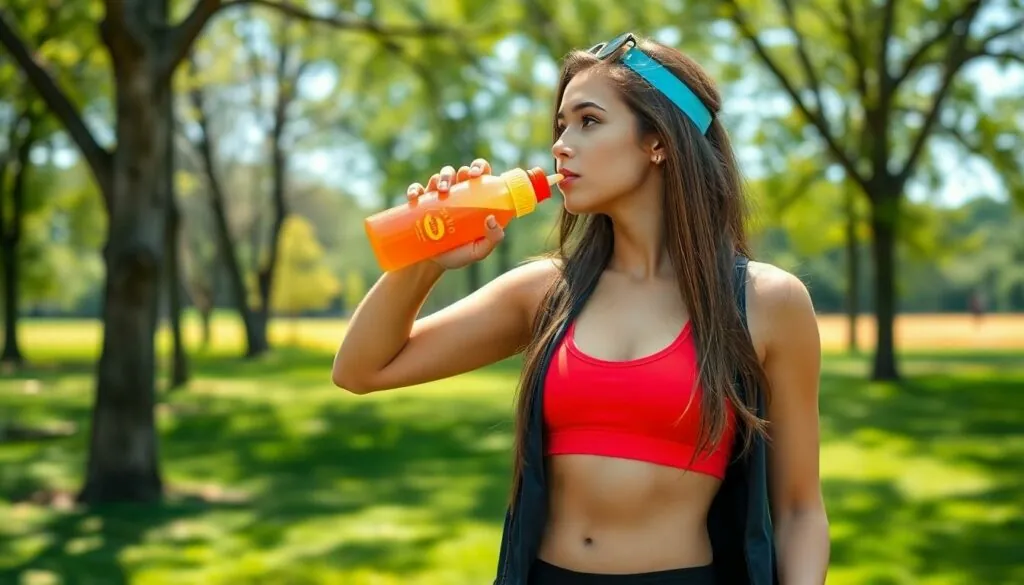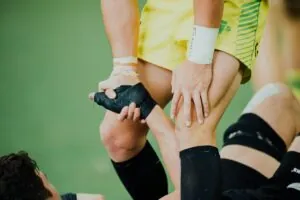When it comes to workouts, hydration is the unsung hero, and electrolytes are its trusty sidekick. But should you sip on that colorful sports drink before you break a sweat or after you’ve turned into a sweaty mess? It’s a question that’s puzzled gym-goers and couch potatoes alike.
Table of Contents
ToggleUnderstanding Electrolytes
Electrolytes play a vital role in maintaining body functions and performance. These electrically charged minerals include sodium, potassium, calcium, magnesium, chloride, and bicarbonate.
What Are Electrolytes?
Electrolytes are essential ions found in bodily fluids. They help regulate hydration, nerve function, and muscle contractions. Nutrient sources of electrolytes consist of fruits like bananas and oranges, vegetables like spinach and kale, and various sports drinks.
Importance of Electrolytes for Hydration
Electrolytes significantly affect hydration levels. They facilitate water retention in cells and tissues, ensuring optimal fluid balance. Individuals lose electrolytes through sweat during exercise. Restoring these minerals helps improve recovery and performance. Hydrating with electrolytes boosts stamina and reduces fatigue, especially during intense workouts.
Timing of Electrolyte Consumption

Electrolyte timing can significantly influence hydration and performance during workouts. Choosing when to consume electrolytes plays a key role in optimizing physical prowess.
Benefits of Drinking Electrolytes Before a Workout
Drinking electrolytes before a workout enhances hydration levels, which is vital for peak performance. These minerals ensure cells maintain optimal fluid balance, preventing early fatigue. Athletes can experience improved endurance when they enter a workout fully hydrated. Consuming electrolyte-rich beverages can also help delay the onset of muscle cramps. A pre-workout electrolyte boost may support better nerve function, allowing for smoother muscle contractions throughout the session.
Benefits of Drinking Electrolytes After a Workout
Post-workout electrolyte intake aids in recovery and replenishment of lost minerals. Consuming electrolytes helps restore hydration levels, thus enhancing muscle repair. Replenishing sodium, potassium, and magnesium can improve overall recovery times and reduce fatigue. Enhanced recovery leads to better athletic performance in subsequent sessions. Drinking electrolytes after exercising minimizes the risk of cramping and supports cardiovascular function during rest.
Factors to Consider
Understanding key factors helps in deciding when to consume electrolytes. Timing can significantly affect hydration and performance.
Type of Workout
Certain workouts require specific electrolyte strategies. Aerobic exercises, like running or cycling, often lead to more fluid loss. In contrast, strength training may not deplete electrolytes as quickly. For endurance athletes, consuming electrolytes before a workout enhances hydration and sustains energy levels. Some professionals suggest sipping electrolytes during long events for ongoing support. Additionally, a varied electrolyte intake may suit different workout types, helping maintain optimal performance.
Duration and Intensity of Exercise
Duration and intensity play crucial roles in electrolyte consumption. Short, moderate workouts typically don’t necessitate pre-workout electrolyte intake. Generally, exercising for over one hour or engaging in high-intensity training increases sweat loss, necessitating electrolytes before and during the activity. For those participating in longer sessions, replenishing electrolytes post-workout significantly aids recovery. Hydration strategies can vary based on personal goals and exercise types, impacting overall performance.
Individual Hydration Needs
Personal hydration needs depend on several factors, including sweat rate, body size, and environmental conditions. Some individuals sweat more profusely and lose electrolytes rapidly. Tracking hydration levels can help tailor intake. Considering personal preferences and experiences influences when to consume electrolytes. Some athletes perform better with pre-workout electrolyte drinks, whereas others find post-workout replenishment more effective. Staying attentive to one’s body signals ensures optimized hydration and performance.
Common Myths About Electrolytes
Misunderstanding how electrolytes function often leads to misinformation regarding hydration strategies. Many people believe that consuming electrolytes before a workout is unnecessary if hydration is adequate. Drinking fluids beforehand does not guarantee electrolyte balance, especially during intense activities.
Misconceptions About Pre-Workout Hydration
Some think hydration only requires water intake before exercise. Electrolytes play a significant role in this process; they enhance fluid retention and balance. Consuming electrolyte-infused beverages can improve endurance and prevent muscle cramps. Others assume that only high-intensity athletes benefit from pre-workout electrolytes. However, even moderate exercisers can gain advantages. Ignoring electrolyte consumption may result in premature fatigue.
Misconceptions About Post-Workout Hydration
Many believe rehydration is only about replacing lost fluids after workouts. Electrolyte replenishment also holds significant importance during this period. Skipping electrolytes can hinder recovery, leading to prolonged fatigue. Some individuals think that plain water suffices for recovery. However, without restoring electrolytes, muscle function and hydration levels may suffer. It’s a common error to underestimate the role of electrolytes after exercise, as they facilitate recovery and minimize cramping.
Hydration and electrolyte balance are vital for anyone engaging in physical activity. Whether to consume electrolytes before or after a workout depends on individual needs and workout intensity. Drinking them beforehand can enhance performance and delay fatigue while replenishing lost minerals post-workout is crucial for recovery.
Understanding personal hydration requirements and adjusting electrolyte intake accordingly can lead to better workout outcomes. By incorporating electrolytes into a fitness routine, individuals can optimize both their performance and recovery, ensuring they stay energized and ready for their next session.





